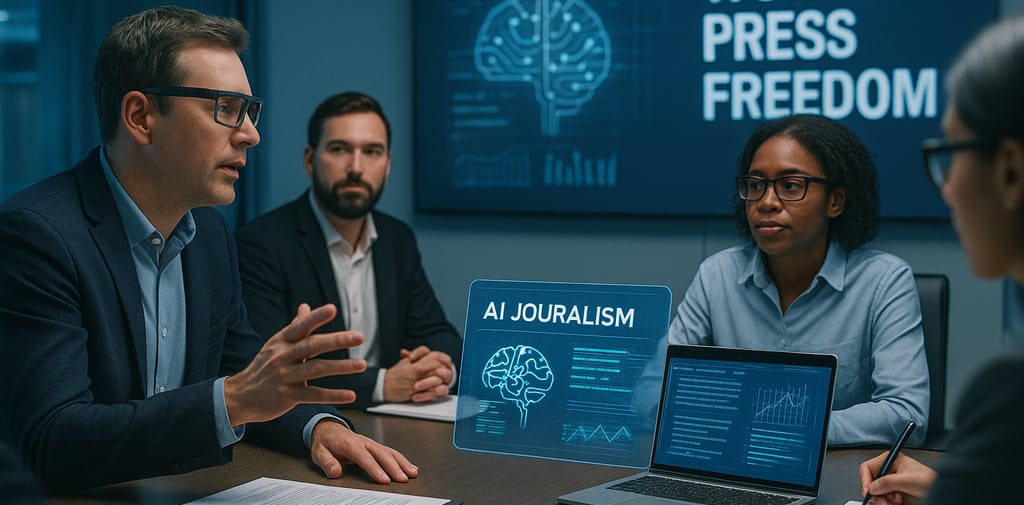World Press Freedom Day 2025 – “Reporting in the Brave New World”
World Press Freedom Day 2025 Marked under the theme “Reporting in the Brave New World”, this year’s event focused on the growing influence of artificial intelligence on journalism. Hosted by UNESCO in Brussels, the global conference brought together media professionals, policymakers, and AI experts to address both the opportunities and risks AI presents—such as enhanced fact-checking versus increased surveillance and algorithmic bias. Key messages emphasized the urgent need for ethical safeguards, media literacy, and protections for journalists worldwide. Notably, La Prensa of Nicaragua was awarded the UNESCO press freedom prize, prompting diplomatic backlash. The day served as a rallying call for transparency, safety, and integrity in the digital age.
2 min read


1. UNESCO’s Global Signature Event (Brussels, 3–5 May)
Keynote & Conference Focus
UNESCO hosted an international conference under the patronage of H.E. Dr Paul Morcos (Information Minister, Lebanon), centring on AI's opportunities and risks for journalism—including threats to editorial independence, disinformation, surveillance—and strategies for democratic media empowerment defenddefenders.org+3unesco.org+3unesco.org+3.
The event featured thematic sessions involving media professionals, AI specialists, academics, policymakers, and civil society, all exploring ethical AI frameworks, content integrity, and newsroom viability unric.org+2unesco.org+2coe.int+2.Media & Information Literacy Initiative
UNESCO, in partnership with Lebanon’s Ministry of Information and the Organisation Internationale de la Francophonie (OIF), launched a campaign promoting critical thinking and fact-checking to combat disinformation. They also provided six field cameras to Lebanese reporters trained in fact-checking unric.org+6unesco.org+6unesco.org+6.Youth Engagement
University student reporters from UNESCO’s Youth Newsroom were embedded in the event, covering sessions and conducting on-site interviews—gaining critical practical training and amplifying fresh perspectives on AI and the media unesco.org.
2. Statements from Key Organizations
United Nations (UN) Secretary‑General António Guterres
Delivered a Message urging the development of a “humane information ecosystem” in which AI must support fact-based journalism and protect freedom of expression unesco.org+2press.un.org+2unesco.org+2.European Union (High Representative)
Warned of increasing media threats—funding cuts, press repression, violence, and AI-enabled surveillance—and reaffirmed support for UNESCO’s efforts and the OECD media principles consilium.europa.eu.Centre for Human Rights, University of Pretoria
Commended AI’s role in fact-checking, data analysis, and translation, while condemning unregulated algorithmic bias, surveillance of journalists, and calls for binding legal frameworks—especially in Africa consilium.europa.eu+2chr.up.ac.za+2apnews.com+2.DefendDefenders (East & Horn Africa)
Highlighted AI-enhanced surveillance, automated censorship, and adversarial disinformation tools as emerging threats. Advocated for robust legal protections and human rights–based oversight epthinktank.eu+5defenddefenders.org+5mediafreedomcoalition.org+5.Council of Europe
Reaffirmed the necessity of protecting journalists from threats and impunity, including during their Annual “Journalists Matter” conference—emphasising prevention, prosecution, and state accountability consilium.europa.eu+9coe.int+9chr.up.ac.za+9.
3. Illustrative Cases & Statistics
Honouring La Prensa (Nicaragua)
UNESCO awarded the prestigious Guillermo Cano World Press Freedom Prize 2025 to La Prensa—a Nicaraguan newspaper publishing from exile. In response, Nicaragua announced its withdrawal from UNESCO, condemning the decision as politically motivated coe.int+4unesco.org+4apnews.com+4.Attacks on Journalists Worldwide
The Committee to Protect Journalists reported 124 media-related deaths in 2024 (the worst in three decades), including conflict zones such as Palestine, Sudan, Myanmar, and more. These findings underscore escalating threats to press freedom theguardian.com.AI in Journalism
AI tools—such as automated fact‑checkers, data analysis platforms (e.g., Dataminr, NewsWhip), and transcription services—were celebrated for their powerful potential but cautioned against due to algorithmic biases and misuse en.wikipedia.orgchr.up.ac.za.
4. Key Takeaways & Industry Outlook
OpportunityChallenge & ConcernFact-checking & Translation — AI offers speed and scaleSurveillance & Censorship — Biometric tracking, platform filteringNew educational campaigns – fostering media literacyAlgorithmic opacity — hidden moderation decisions drive biasYouth-led reporting – empowering the next generationState & Digital Repression — authoritarian regimes exploit AI
5. Conclusions & Next Steps
World Press Freedom Day 2025 successfully sparked a nuanced global dialogue on the intersection of AI and press freedom—highlighting both promise and peril. The consensus across speakers and organisations emphasised that:
Responsible & transparent AI systems are essential to preserve editorial independence.
Legal and international safeguards—especially in vulnerable regions—must be codified and enforced.
Journalists’ safety (physical and digital), equitable economic support, and capacity-building remain non-negotiable priorities.
© 2025 WPF News – Independent Journalism in the Public Interest
Contact
Subscribe to our newsletter
© 2002 - 2026. All rights reserved.
